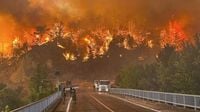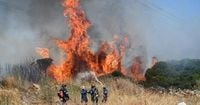Turkey is currently grappling with a severe wildfire crisis that has escalated dramatically over the past weeks, particularly threatening Bursa, the country’s fourth-largest city. The wildfires, fueled by unprecedented heatwaves, dry conditions, and strong winds, have forced the evacuation of more than 3,500 residents in the Bursa area alone and claimed at least 17 lives nationwide since late June.
On the weekend of July 26-27, 2025, fires raged fiercely around Bursa, casting a thick, fog-like smoke over the city by Monday morning. The blaze was so intense that it illuminated the eastern suburbs with a haunting red glow overnight, alarming residents and authorities alike. The governor’s office confirmed that 1,765 people were safely evacuated from the region, while over 1,100 firefighters worked tirelessly to contain the flames.
These wildfires are part of a broader pattern of devastating blazes that have swept across Turkey, with the Forestry Minister Ibrahim Yumakli reporting that on Sunday alone, teams battled at least 44 separate fires across the country. The most serious fires were concentrated in Bursa province, Karabuk in the northwest, and Kahramanmaras in the south. Karabuk has been particularly hard hit, with fires burning there since July 22.
Tragically, the human toll has been significant. The death toll from the wildfires rose to 17 by late July, including 10 rescue volunteers and forestry workers who died in a fire in Eskisehir on July 23. More recently, two volunteer firefighters lost their lives after being pulled from a water tanker that rolled en route to a forest fire near Bursa. Another worker died at the scene of the accident, and a firefighter succumbed to a heart attack on July 27. These losses underscore the perilous conditions faced by those on the front lines.
The Turkish government has declared disaster zones in the western provinces of Izmir and Bilecik to mobilize resources and coordinate emergency responses more effectively. Justice Minister Yilmaz Tunc revealed that prosecutors have launched investigations into fires in 33 provinces since June 26, with legal action taken against 97 suspects believed to be linked to the cause of some fires. This move signals a firm stance against those responsible, as authorities seek to prevent further devastation.
The wildfires coincide with record-breaking heat in Turkey and the wider eastern Mediterranean region. On July 25, the General Directorate of Meteorology confirmed a staggering 50.5 degrees Celsius (122.9 degrees Fahrenheit) in Sirnak province, marking the highest temperature ever recorded in the country. Such extreme heatwaves have been relentless, hitting 132 locations with record temperatures and creating dangerously dry conditions that exacerbate fire risks.
The crisis is not confined to Turkey alone. Neighboring Greece is also battling wildfires amid a scorching summer heatwave that has pushed temperatures close to 44 degrees Celsius (111 degrees Fahrenheit) in some areas. Over the weekend, evacuation orders were issued for several Greek towns, including a village near Athens. Although officials stated that the fire near Athens was contained by Sunday, they warned of potential rekindling due to swirling embers. Meanwhile, fires continue to burn on the island of Kythira and in Messinia on the Peloponnese peninsula, where high winds and heat fuel ongoing blazes.
Greece’s fire service spokesman, Vassilis Vathrakoyiannis, emphasized the strain on firefighting resources, noting that the fire service would have struggled if additional major fires had broken out simultaneously. The Greek government has deployed a record number of firefighters this season to tackle what climate experts attribute to the growing impact of climate change. Giannis Kefalogiannis, Greece’s climate crisis and civil protection minister, highlighted the human cost and environmental damage wrought by the fires, stating, “We have injured firefighters, human lives were put at risk, homes were burned and forestland destroyed.”
In response to the widespread threat, Bulgaria, Turkey’s neighbor, has enlisted support from European Union partners, including the Czech Republic, Slovakia, France, Hungary, and Sweden, who are sending aircraft to assist with firefighting efforts. This regional cooperation underscores the transnational nature of the wildfire crisis exacerbated by extreme weather patterns.
The wildfires have also severely disrupted life and travel in Turkey. The main highway connecting Bursa to Ankara was closed due to the fires, complicating evacuation and firefighting efforts. Many tourist destinations in affected regions have been closed or rendered inaccessible, with cancellations mounting and some hotels and restaurants temporarily shutting down. Flights into and out of the area have experienced delays and rerouting, adding to the economic strain on Turkey’s vital tourism sector.
Experts warn that the current wildfire crisis is a stark indicator of the growing threat posed by climate change. As global temperatures rise, extreme heatwaves and wildfires are becoming more frequent and intense, putting countries like Turkey and Greece at heightened risk. The tourism industry, a crucial economic pillar for these nations, faces significant challenges in adapting to these evolving environmental threats.
In Turkey, there is a pressing need for sustainable tourism practices and improved emergency preparedness to mitigate the impact of future wildfires. Travelers are urged to stay informed about the situation, heed safety warnings, and be ready to adjust their plans accordingly. The government’s swift response and the courage of firefighters have saved lives and protected infrastructure, but the danger remains high as the wildfire season continues.
As southern Europe endures one of its most severe heatwaves in recent memory, the wildfires ravaging Turkey and Greece serve as a sobering reminder of the urgent need to address climate change and its far-reaching consequences. The resilience of communities, the dedication of emergency services, and regional cooperation will be critical in confronting this escalating crisis.





